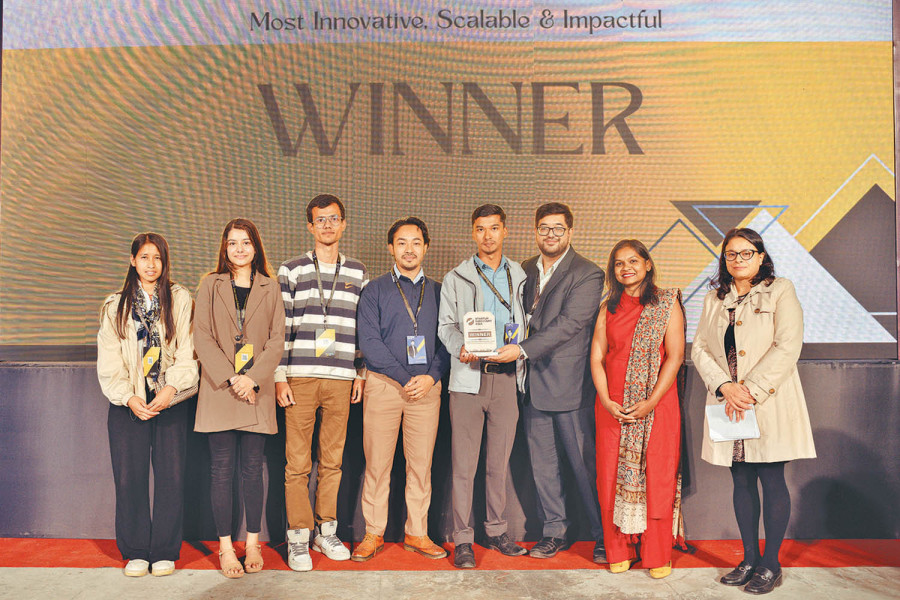Climate & Environment
Agri Direct wins most innovative startup at Climate Change Competition
Sakal Bio Enzyme Nepal and Reverse Vending Machine Nepal also bagged the awards. Seven Nepali environmental startups proposed their pitches for a greener future.
Ellie Davis
Startup Discovery Asia (SDA) received 122 applications from environmental entrepreneurs across Nepal, though only seven were selected to give their pitches at SDA’s Climate Change Competition. All seven of the startups gained exposure, training, and mentorship, though only three walked away with a portion of the prize money that totalled 200,000 rupees.
“Anyone who is working on climate startups, you are a champion—you are the torch bearer”, SDA Co-founder and Head of Programmes Samanata Thapa said at the award ceremony on Wednesday.
A three-judge panel that evaluated their pitches found the proposal of Agri Direct the most innovative product and awarded it with the prize money of Rs100,000.
Samanata Thapa and Aankshita Chaudhary, who both have a background in business, co-founded Startup Discovery Asia two months ago as a subsidiary of the Startup Discovery School, a private company which is based in the UK and West Africa that gives educational and financial support to entrepreneurs addressing climate change.
SDA CEO Chaudhary worked for Startup Discovery School in the UK for three years but wanted to return to Nepal to bring SDS’s mission to a new region. The Asia chapter of Startup Discovery aims to support startups led by youth, women, and marginalised communities in South Asia that are working to address social, environmental, and economic challenges.
“We are working at the intersection of climate, innovation, and diversity,” Chaudhary said at the event. “We are identifying and backing founders that are tackling the region’s biggest climate challenges for us.”
The company’s work thus far has focused exclusively on Nepal, a country which, as many speakers noted, is not responsible for significant amounts of climate change but is already facing the consequences.
“When we look at the climate, we are one of the most vulnerable countries, and having contributed so little to GHG [greenhouse gas], we are still having to pay for the emissions,” Sharad Tuladhar, chief of Policy and Environment and Social Department at the NMB Bank said at the event.
At first, Thapa and Chaudhary faced scepticism that there was enough innovation in Nepal for SDA’s work to have an impact. “People kept [asking us] what are you going to support? This is not going to survive,” Thapa said.
After founding SDA, however, Thapa and Chaudhary did not struggle to find a diverse set of entrepreneurs excited to learn and grow. The seven startup companies developed their pitches for the event after attending four virtual workshops in the last month and receiving mentorship from SDA.
The entrepreneurs shared ideas including an air pollution monitoring device, a process of manufacturing pipes out of recycled plastic, mitigating warming temperatures in cities through rooftop vegetation, and a carbon emissions accounting software for companies to track their climate impact.
“This company [Agri Direct] has a very clear idea on how to reduce emissions, how to help a very large user base, which is very relevant for Nepal, and deal with climate change while reducing their costs,” climate journalist Neelima Vallangi from India, who was one of those who judged the pitches, told the Post.
Agri Direct Co-CEO Ajay Shahi watched his family’s small poultry farm in Lalitpur struggle to make a profit due to the growing costs of imported soybean poultry feed. A year ago, Shahi and a team of other students finishing their bachelor’s degrees carried forward existing research on black soldier flies by building an incubation box that allows them to cultivate fertiliser and poultry feed from the flies in any climate.
“We are feeling extremely delighted and happy with the win, because of all the hard work we had put into business overall since the start,” Agri Direct Research Associate Manasvi Lamichhane told the Post.
Sakal Bio Enzyme Nepal, a company that produces a household cleaning product out of organic waste, received 50,000 rupees for presenting the most impactful product. Another startup, Reverse Vending Machine Nepal, received the same sum for being the most scalable company, with a thermal energy and AI-monitoring system for storing food and agriculture products in cold temperatures.
Officials at the SDA argued that, with the right innovations, fighting climate change and generating profit can go hand-in-hand.
“For us, it has been at the core that we are a private company, but can still create an impact,” Chaudhary told the Post.
“We need the private ecosystem to enter this [climate] market because somebody has to make all of this sustainability profitable too because otherwise, we're not going to invent solutions,” Vallangi said.
At the Climate Change Competition, SDA also launched their next initiative: Alpha Angels, a collection of investors looking to support startups with missions similar to those who gave their pitches.
“There are also other innovators and startups who are looking for funds to kickstart what they’re doing,” Thapa told the event attendees. “We could give out this money as a seed for them … to make change and to believe in their dreams.”




 9.7°C Kathmandu
9.7°C Kathmandu










